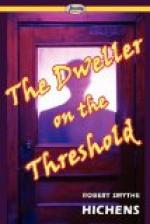“At first it seemed to me that my companion must have crept out of the room silently, leaving me by myself in the darkness. I shuddered at the thought that I was alone. But then I said to myself that Marcus Harding must be there in the blackness opposite to me, and I moved my hands furtively on the table, thinking to prove his presence to myself by touch. I did not prove it. Suddenly I had no need to touch him in order to know that he was there.”
“Why not?” said the professor, and started at the sound of his own voice in the little room.
“Something made me realize that he was still within the room. Nevertheless, I felt that I was alone. How could that be? I asked myself that question. This answer came as it were sluggishly into my mind, ’You are alone not because Marcus Harding is away, but because Henry Chichester is away.’ For a long while I sat there stagnantly dwelling on this knowledge which had come to me in the blackness. It was as if I knew without understanding, as a man may know he is involved in a catastrophe without realizing how it has affected his own fate. And then slowly there came to me, or grew in me, an understanding of how I was alone. I was alone with Marcus Harding at that moment because I was Marcus Harding. A shutter seemed to slide back softly, and for the first time I, Marcus Harding, stared upon myself out of the body of another man, of Henry Chichester. I was alone with my soul double. Motionless, silent, I gazed upon it. Now I understood why I had been tortured with anxiety lest the world should learn to comprehend Marcus Harding as I comprehended him. Now I understood why neither he nor I had been able to break that mysterious link which our sittings had forged between us. I had been trying ignorantly to protect myself, to conceal my own shortcomings, to cover my own nakedness. I had sweated with fear lest my own truth should be discovered by all those to whom for so many years I had been presenting a lie. Yes, I had sweated with fear; but even then how little I had known! A voice cried out suddenly, ‘Turn on the light!’ It was the voice of my double. It seemed to awake, or to recall perhaps,—how can I say?—Henry Chichester. I was aware of a shock; it seemed strongly physical. I got up at once and turned the light on. Marcus Harding was before me, trembling, ashen. ‘What is it? What has happened?’ he said in a broken voice. I made no reply. He left me. I heard his step in the street—out there!”
Chichester was silent. The professor said nothing for a moment, but passed his tongue twice over his lips and swallowed, sighing immediately afterward.
“Transferred personality!” he muttered—“transferred personality. Is that what you’d have me believe?”




